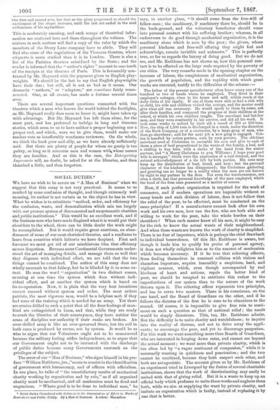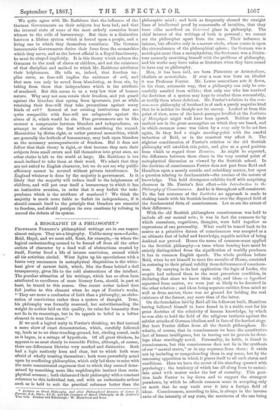SOCIAL DUTIES.*
WE have no wish to be severe on "A Man of Business" when we suggest that this essay is not very practical. It seems to us marked by some confusion of thought, and though extremely well meaning, its author is not certain as to the object he has in view. What he wishes is to substitute "method, order, and efficiency for the confusion, waste, and demoralization which mix too largely with our present system of disconnected and unsystematic charities and public institutions." This would be an excellent work, and if the business men who have made England what it is would put their -shoulders to the wheel, there can be little doubt the work might be accomplished. But it would require great exertions, an aban- donment of some of our most cherished theories, and a readiness to learn from countries which hitherto we have despised. First and -foremost we must get rid of our mischievous idea that efficiency means despotism. Because some Continental Governments under- .stand the art of managing details, and manage them so well that they dispense with individual effort, we are told that the two things cannot be combined. The author of this essay does not wholly succumb to that fallacy, but he is blinded by it to some ex- tent. He uses the word " organization" in two distinct senses, meaning at one time the system which does without indi- vidual effort, and at another the system which is based on sits co-operation. Now, it is plain that the very best intentions cannot succeed without system and order. The moat ardent patriots, the most vigorous men, would be a helpless mob if they Itad none of the training which is needed for an army. Yet there are armies drilled to such a point that all the finer feelings of man- kind are extinguished in them, and that, while they are ready to crush the liberties of their countrymen, they have neither the -sense of discipline nor authority if their ranks are broken. An over-drilled army is like an over-governed State, but the evil in both cases is produced by excess, not by system. It would be as wise to argue that our Volunteers ought not to be manoeuvred because the military feeling stifles independence, as to argue that .our Government ought not to be intrusted with the discharge of public duties because many Governments encroach on the privileges of the subject.
The error of our "Man of Business," who signs himself in his pre- face "William Rathbone, jun.,"seems to consist in the identification .of government with bureaucracy, and of officers with officialism. In one place, he talks of " the unsatisfactory results of mechanical -charity working by organization and by rule," as if all organized charity must be mechanical, and all mechanism must be dead and ungracious. " Where good is to be done to individual men," he • Social Duties Considered with Reference to the Organization of Effort in Works of Zeneeolence and POW. Utility. By a Man of Business. London • Ehtemillau. says, in another place, 'pit should come from the free-will- of
fellow-men ; the machinery, if machinery there be, should be in the back-ground, and the voluntary benefactor should come into personal contact with his suffering brother ; whereas, in all endeavours to do good through mechanical organization, it is the machinery alone which is seen by •the poor ; the givers, whose personal kindness and free-will offering they might feel and acknowledge, remain invisible and unknown." This is perfectly true, so far as regards the luxury of doing good. But we do not see, and Mr. Rathbone has not shown us, how this personal con- tact is to be effected on the large scale required by the poverty of our cities. The very remarks made in the opening chapter on the
increase of labour, the completeness of mechanical organization, the growth of population, and the rapidity with which great
works are executed, testify to the difficulties of the scheme :—
The father of the present manufacturer often knew every one of the hundred or two of hands whom he employed. They lived in their employer's cottages, close to his house and mill, within reach of the daily visits of his family. If one of them were sick or had a sick wife or child, his wife and children visited the cottage, and the master could give what aid was necessary. He would speak to them by name, ask after their families, and commend the progress of their children at the school, at which his own children taught. The merchant had but few men, and they were constantly in his service, and did all his work. It took some weeks to unload by their aid a vessel of 200 or 300 tons. Now, the ship of 1,500 tons is discharged in a week, under the direction of the Dock Company, or of a contractor, by a large gang of men, who then go elsewhere ; and for the next job a new gang is engaged. Cot- ton is handled by cotton porters, corn by corn porters. The old-time merchant used at Christmas to assemble his mon and give to each of them a piece of beef proportioned to the wants of the family, a loaf, and a shilling to buy beer, with a shake of the hand from the senior partner, and "A Merry Christmas to you, Williams ; I hope your good wife is stronger," which were the expression of a real interest, and the natural acknowledgment of a tie felt by both parties. His sons may keep up the distribution of beef, bread, and beer ; but the personal character of the kindness has disappeared; the Christmas gathering and greeting can no longer be a reality when the men are not known by sight to any partner in the firm. Not even the warehouseman, not even a clerk, has that personal knowledge of the men employed, which the head of the firm once possessed as a matter of course.
Now, if such perfect organization is required for the work of commerce, and if modern operations are impossible without so many hands and such division of labour, does it not follow that the relief of the poor, to be effectual, must be conducted on the
same principles? If a manufacturer cannot look after his own work and his own men, how can the few, who are both able and willing to work for the poor, take the whole burden on their shoulders ? When each master knew all his men, it might be easy for the rich to know the actual wants of their neighbourhood. And when those wants are known the work of charity is simplified. There is no fear of imposture, which is perhaps the chief drawback to individual benevolence. Of this Mr. Rathbone is aware, but though it leads him to qualify his praise of personal agency,
it does not wholly enlighten him as to the amount of mechanism which becomes necessary. If it be true that relieving officers, from finding themselves in constant collision with vicious and shameless imposture, acquire insensibly a suspicious, hard, and vigilant manner, which, even though accompanied by real kindness of heart and actions, repels the better kind of poor, we should be tempted to attribute this rather to the imperfections of our system than to the nature of the work thrown upon it. The relieving officer represents two principles, and has to serve two masters. There is his conscience, on the one hand, and the Board of Guardians on the other, and if he follows the dictates of the first he is sure to be obnoxious to the second. Of course, it is impossible to give free rein to senti- ment on such a question as that of national relief ; the result would be simply disastrous. This, too, Mr. Rathbone admits. But the difficulty is to unite charity and watchfulness ; to inquire into the reality of distress, and not to drive away the appli- cants; to encourage the poor, and yet to discourage pauperism. For this work we want something more than Boards of Guardians, who are interested in keeping down rates, and cannot see beyond the actual moment ; we want more than private charity, which is too often led by "a vague sentiment of compassion," while it is necoasarily wanting in quickness and penetration ; and the two cannot be combined, because they both suspect each other, and both are antagonistic. The account given us by Mr. Rathbone of an experiment tried in Liverpool by the fusion of several charitable institutions, shows that the work of discriminating may easily be united with that of giving relief. But it is a waste to keep up an official body which professes to unite these works and neglects theta both, while we aim at supplying the want by private charity, and imitate an organization which is faulty, instead of replacing it by one that is better. We quite agree with Mr. Rathboue that the influence of the German Governments on their subjects has been bad, and that the internal state of some of the most orderly countries bears witness to the evils of bureaucracy. But there is a distinction between a lifeless system which is forced upon a people, and a living one to which they themselves contribute. The German bureaucratic Governments derive their force from the monarchies which they serve, and as the lowest official is a Royal functionary, he must be obeyed implicitly. It is this theory which reduces the Germans to the rank of slaves or children, and not the existence of that discipline and method to which Mr. Rathbone attributes their helplessness. He tells us, indeed, that freedom im- plies error, as free-will implies the existence of evil, and that men can only be saved frem blundering, as from sin, by taking from them that independence which is the attribute of manhood. But this seems to us a very low view of human nature. Why may not men retain their freedom, and yet guard against the blunders that spring from ignorance, just as while retaining their free-will they take precautions against many kinds of evil ? Several of our existing institutions that are quite compatible with free-will are safeguards against the abuse of it, which would be sin. Free governments are in like manner a compromise between blunders and independence, an attempt to obviate the first without sacrificing the second. Monarchies by divine right, or rather paternal monarchies, which are generally the hotbeds of bureaucracy, may look upon blunders as the necessary accompaniments of freedom. But it does not follow that their theory is right, or that because they save their .subjects from small errors and fall themselves into great ones, no other choice is left to the world at large. Mr. Rathbone is too much inclined to take them at their word. We admit that they are not suited to English character, but we do not see why public efficiency cannot be secured without private interference. In England whatever is done by the majority is government. Is it likely that the majority will reduce itself to the helplessness of children, and will put over itself a bureaucracy to which it has an instinctive aversion, in order that it may forfeit the inde- pendence which is the attribute of manhood ? We think the majority is much more liable to forfeit its independence, if it should commit itself to the principle that blunders are essential to freedom, and should paralyze its own exertions by refusing to amend the defects of its system.































 Previous page
Previous page